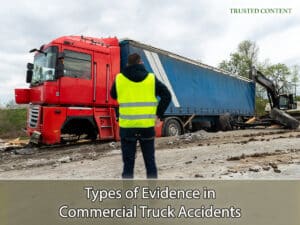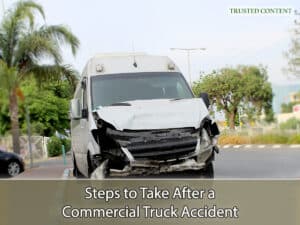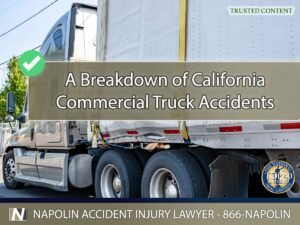A Breakdown of California Commercial Truck Accident Cases
Understanding legal rights after a commercial truck accident is crucial for anyone involved in such an incident. Accidents involving commercial vehicles are particularly challenging due to the size and weight of these trucks, which can result in significant damage and severe injuries. It is essential for victims to be well-informed about their rights and the steps they need to take to seek compensation and justice.
What Defines a Commercial Vehicle in California
In California, a commercial vehicle is defined as a motor vehicle that is required to be registered and is used or maintained for the transportation of persons for hire, compensation, or profit, or is designed, used, or maintained primarily for the transportation of property. This includes a variety of vehicles but excludes passenger vehicles and house cars not used for these purposes, as well as vanpool vehicles.
Examples of commercial vehicles include:
- Delivery vans and trucks
- Semi-trucks and tractor-trailers
- Box trucks and moving trucks
- Utility vehicles used for business purposes
Understanding which vehicles are classified as commercial is important, as these vehicles are subject to specific regulations and insurance requirements that differ from those for personal vehicles.

Types of Evidence in Commercial Truck Accidents
Types of Evidence in Commercial Truck Accidents
In commercial truck accidents, gathering comprehensive evidence is crucial to establishing liability and securing compensation. Various types of evidence play a significant role in these investigations, each contributing valuable information about the accident's circumstances.
- Black Box Data: Records data about the truck’s operation, including speed, brake application, and trip duration. Provides critical insights but is just one piece of the puzzle.
- Police Reports: Detailed accounts of the accident scene, fault assessments, and citations issued. Serve as an official record and are valuable in legal proceedings.
- Eyewitness Testimonies: Firsthand accounts of the accident, offering details that might not be captured by other means. Help clarify how the accident occurred.
- Photographic Evidence: Photos of vehicle damage, road conditions, skid marks, weather, and injuries. Aid in reconstructing the accident and supporting claims.
- Truck Driver Logs: Logs of driving hours, rest breaks, and vehicle inspections. Reveal compliance with regulations and potential issues like driver fatigue.
- Maintenance Records: Insights into the truck’s maintenance history. Indicate whether proper maintenance was conducted, revealing possible negligence.
- Surveillance Footage: Video evidence from surveillance cameras. Offers an objective view of the accident, capturing the sequence of events.
- Expert Analysis: Accident reconstruction experts analyze evidence to clarify complex aspects and provide detailed explanations of the accident.
Collecting and analyzing these various types of evidence can significantly strengthen a commercial truck accident claim, helping to establish fault and support the pursuit of compensation for the victims.
Determining Fault in Commercial Truck Accidents
Determining fault in commercial truck accidents involves a thorough investigation that goes beyond the information provided in the police report. While the police report can offer key details about the incident, additional steps are often necessary to gather a comprehensive understanding of what happened.
Key steps in determining fault include:
- Interviewing eyewitnesses to gather firsthand accounts of the accident
- Reviewing black box data for information on the truck’s operation at the time of the crash
- Consulting with experts who can reconstruct the accident scene
- Examining the truck driver’s logbooks and maintenance records
An experienced accident attorney can handle these investigative tasks, ensuring that all relevant evidence is collected and analyzed. This thorough approach helps identify the at-fault party or parties, which may include the truck driver, the trucking company, or even the manufacturer of a faulty truck component.
California's Comparative Fault Rule
California follows a pure comparative fault rule (California Civil Code 1431.2, for non-economic damages) when determining liability in accident cases. Under this rule, you can seek compensation for your injuries even if you are partially at fault for the accident. However, the amount of compensation you receive will be reduced by your percentage of fault.
For example, if you are found to be 50% at fault for the accident, your compensation will be reduced by 50%. This rule allows victims to recover damages even in cases where they bear a significant portion of the responsibility.
It is important to note that insurance companies and courts will carefully evaluate the circumstances of the accident to determine the degree of fault. Therefore, having strong evidence and legal representation can make a significant difference in the outcome of your case.
Statute of Limitations for Truck Accident Claims in California
In California, the statute of limitations for filing a truck accident claim is generally two years from the date of the accident. However, there are notable exceptions to this rule that can either extend or shorten the filing period.
Exceptions include:
- Minors involved in the accident have until they turn 20 years old to file
- Individuals with certain mental disabilities may receive an extension
- Accidents involving government vehicles or entities typically have a shorter filing period, often just six months, even for minors.
Understanding the specific time frame for your case is critical. Missing the statute of limitations can result in losing the right to seek compensation. Therefore, it is advisable to consult with a knowledgeable attorney promptly to ensure that all deadlines are met and your legal rights are preserved.

Steps to Take After a Commercial Truck Accident
Steps to Take After a Commercial Truck Accident
In the aftermath of a commercial truck accident, taking the right steps is crucial to protecting your legal rights and building a strong case. Here are essential actions to consider:
- Seek medical attention: Your health and safety are the top priority. Even if injuries appear minor, it is important to get a thorough medical examination to document any potential injuries.
- Report the accident: Contact the police to report the accident and ensure an official accident report is filed. This report will be valuable evidence in your case.
- Gather evidence: If it is safe to do so, collect as much information as possible at the scene. Take photos of the vehicles, road conditions, and any visible injuries. Obtain contact information from witnesses and exchange details with the truck driver.
- Document everything: Keep detailed records of medical treatments, expenses, and any communication with insurance companies or other parties involved in the accident.
- Consult with an attorney: Seek legal advice to understand your rights and the next steps in pursuing a claim for compensation.
The Value of Hiring a Truck Accident Lawyer
Hiring a truck accident lawyer can provide numerous benefits when navigating the complexities of a commercial truck accident case. An experienced attorney can offer valuable assistance in several key areas:
Investigation
A thorough investigation is essential to building a strong case. Lawyers can gather critical evidence, such as black box data, maintenance records, and witness statements, to establish fault and liability.
Negotiation
Dealing with insurance companies can be challenging. A lawyer can handle negotiations on your behalf, ensuring that you receive a fair settlement that covers your medical expenses, lost wages, and other damages.
Litigation
If a fair settlement cannot be reached, a lawyer can represent you in court. Their expertise in litigation can significantly improve your chances of securing a favorable verdict.
Many personal injury attorneys work on a contingency fee basis, meaning they only get paid if they win your case. This arrangement provides access to legal representation without upfront costs, making it easier for victims to pursue justice.

A Breakdown of California Commercial Truck Accident Cases
A Breakdown of California Commercial Truck Accident Cases
If you or a loved one has been involved in a commercial truck accident in southern California, it is crucial to take action to protect your rights and secure the compensation you deserve. Navigating the aftermath of such accidents can be overwhelming, but you do not have to face it alone.
At Napolin Accident Injury Lawyer, we have extensive litigation experience in handling commercial truck accident cases. Our dedicated legal team is committed to fighting for the rights of injury victims and ensuring they receive the justice and compensation they are entitled to.
We offer free consultations to discuss your case and explore your legal options. During this consultation, we will evaluate the details of your accident, answer any questions you may have, and provide you with a clear understanding of the next steps. There is no obligation, our goal is to help you make informed decisions about your legal rights.
Contact us today at (866)-NAPOLIN to schedule your free consultation near the Inland Empire. Our experienced attorneys are ready to assist you with personalized and compassionate legal representation. We understand the complexities of commercial truck accident cases and will work tirelessly to achieve the best possible outcome for you and your family. Do not wait—reach out now to secure the legal help you need to move forward with confidence.
- Understanding Uber Accidents and Insurance Coverage Periods in California - April 8, 2025
- A Guide on Red Light Auto Accidents in California - August 14, 2024
- Self-Representing in a California Personal Injury Claim - August 13, 2024
